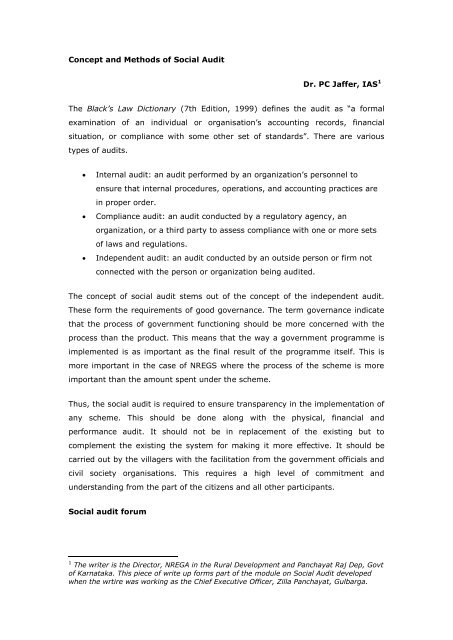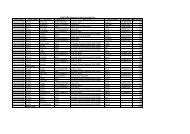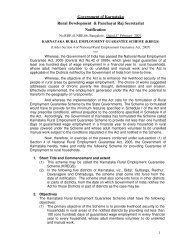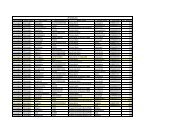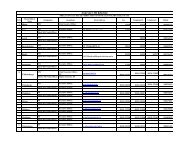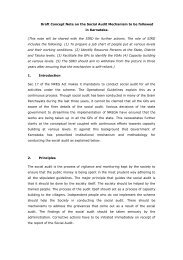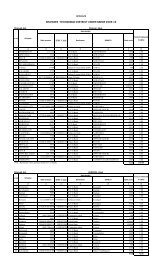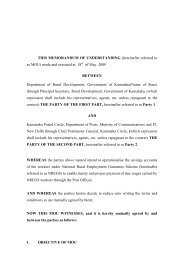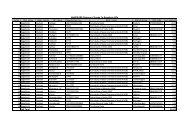Concept and Methods of Social Audit Dr. PC Jaffer, IAS1 The Black's ...
Concept and Methods of Social Audit Dr. PC Jaffer, IAS1 The Black's ...
Concept and Methods of Social Audit Dr. PC Jaffer, IAS1 The Black's ...
Create successful ePaper yourself
Turn your PDF publications into a flip-book with our unique Google optimized e-Paper software.
<strong>Concept</strong> <strong>and</strong> <strong>Methods</strong> <strong>of</strong> <strong>Social</strong> <strong>Audit</strong><br />
<strong>Dr</strong>. <strong>PC</strong> <strong>Jaffer</strong>, IAS 1<br />
<strong>The</strong> Black’s Law Dictionary (7th Edition, 1999) defines the audit as “a formal<br />
examination <strong>of</strong> an individual or organisation‟s accounting records, financial<br />
situation, or compliance with some other set <strong>of</strong> st<strong>and</strong>ards”. <strong>The</strong>re are various<br />
types <strong>of</strong> audits.<br />
� Internal audit: an audit performed by an organization‟s personnel to<br />
ensure that internal procedures, operations, <strong>and</strong> accounting practices are<br />
in proper order.<br />
� Compliance audit: an audit conducted by a regulatory agency, an<br />
organization, or a third party to assess compliance with one or more sets<br />
<strong>of</strong> laws <strong>and</strong> regulations.<br />
� Independent audit: an audit conducted by an outside person or firm not<br />
connected with the person or organization being audited.<br />
<strong>The</strong> concept <strong>of</strong> social audit stems out <strong>of</strong> the concept <strong>of</strong> the independent audit.<br />
<strong>The</strong>se form the requirements <strong>of</strong> good governance. <strong>The</strong> term governance indicate<br />
that the process <strong>of</strong> government functioning should be more concerned with the<br />
process than the product. This means that the way a government programme is<br />
implemented is as important as the final result <strong>of</strong> the programme itself. This is<br />
more important in the case <strong>of</strong> NREGS where the process <strong>of</strong> the scheme is more<br />
important than the amount spent under the scheme.<br />
Thus, the social audit is required to ensure transparency in the implementation <strong>of</strong><br />
any scheme. This should be done along with the physical, financial <strong>and</strong><br />
performance audit. It should not be in replacement <strong>of</strong> the existing but to<br />
complement the existing the system for making it more effective. It should be<br />
carried out by the villagers with the facilitation from the government <strong>of</strong>ficials <strong>and</strong><br />
civil society organisations. This requires a high level <strong>of</strong> commitment <strong>and</strong><br />
underst<strong>and</strong>ing from the part <strong>of</strong> the citizens <strong>and</strong> all other participants.<br />
<strong>Social</strong> audit forum<br />
1 <strong>The</strong> writer is the Director, NREGA in the Rural Development <strong>and</strong> Panchayat Raj Dep, Govt<br />
<strong>of</strong> Karnataka. This piece <strong>of</strong> write up forms part <strong>of</strong> the module on <strong>Social</strong> <strong>Audit</strong> developed<br />
when the wrtire was working as the Chief Executive Officer, Zilla Panchayat, Gulbarga.
<strong>The</strong> social audit will be carried out through the meetings <strong>of</strong> the all the villagers in<br />
the form <strong>of</strong> Grama Sabha at least twice in a year. At these <strong>Social</strong> <strong>Audit</strong> Forums,<br />
information will be read out publicly <strong>and</strong> people will be given an opportunity to<br />
question <strong>of</strong>ficials, seek <strong>and</strong> obtain information, verify financial expenditure,<br />
examine the provision <strong>of</strong> entitlements, discuss the priorities reflected in choices<br />
made <strong>and</strong> critically evaluate the quality <strong>of</strong> work as well as the services <strong>of</strong> the<br />
programme staff.<br />
Comprehensive public hearings to be called social audit forums relating to works<br />
<strong>and</strong> individual entitlements must be held twice a year at the gram sabha level for<br />
all works done in the preceding period. <strong>The</strong> forum will give people the opportunity<br />
to review compliance with the ongoing requirements <strong>of</strong> transparency <strong>and</strong><br />
accountability, <strong>and</strong> will also serve as an institutional forum where people can<br />
conduct a detailed public audit <strong>of</strong> all NREGS works that have been carried out in<br />
their area in the preceding six months. An effective social audit forum will focus<br />
on the dissemination <strong>of</strong> information among the public <strong>and</strong> the m<strong>and</strong>atory agendas<br />
<strong>of</strong> the social audit forum. <strong>The</strong> forum should discuss the matters like non-<br />
availability <strong>of</strong> information, lack <strong>of</strong> people‟s participation in NREGS, failure <strong>of</strong><br />
grievance redressal mechanisms <strong>and</strong> such other issues.<br />
Some questions related to publicity, preparation <strong>and</strong> compilation <strong>of</strong> documents<br />
that can be asked:<br />
1. Does the file have all the documents required?<br />
2. Were all the documents available for scrutiny at least 15 days before the<br />
social audit forum?<br />
3. Were charts <strong>of</strong> the summary sheets available for public display <strong>and</strong><br />
scrutiny before <strong>and</strong> during the social audit forum?<br />
4. Was the muster roll summary read out aloud to check for discrepancies?<br />
5. Was the summary <strong>of</strong> the bills read out aloud to check for discrepancies?<br />
6. Was the measurement book summary read out aloud?<br />
7. Were the photographs taken before, during <strong>and</strong> after the work made<br />
available for public display <strong>and</strong> scrutiny during the social audit forum?<br />
8. Was the monitoring <strong>and</strong> vigilance committee formed as per the norms?<br />
9. Has the vigilance committee submitted its report?<br />
How to conduct <strong>Social</strong> <strong>Audit</strong>?
<strong>The</strong> social audit should be conducted throughout various stages <strong>of</strong> the<br />
implementation <strong>of</strong> the NREGS. <strong>The</strong>re are questions to be asked about the scheme<br />
at different stages <strong>of</strong> the implementation <strong>of</strong> the scheme. <strong>The</strong> following are the<br />
possible questions that can be asked during the process <strong>of</strong> social audit.<br />
Like any activity, the preparation is as important in the success <strong>of</strong> social audit as<br />
the process itself. Following are required to be taken in to notice while preparing<br />
for the social audit in the village. <strong>The</strong> most important step in the success <strong>of</strong> the<br />
social audit process is the participation <strong>of</strong> the citizen. <strong>The</strong> participation becomes<br />
meaningful only if the citizens are aware <strong>of</strong> the scheme, the process <strong>of</strong> social<br />
audit <strong>and</strong> the location <strong>and</strong> time <strong>of</strong> the social audit. <strong>The</strong> major task will be to bring<br />
together people belonging to various caste <strong>and</strong> community <strong>and</strong> political groups.<br />
<strong>The</strong> part <strong>of</strong> the elected members <strong>of</strong> the GP is very important. Representative<br />
committees <strong>and</strong> user groups can be formed to represent public interest at<br />
different levels so that continued monitoring <strong>of</strong> the implementation <strong>of</strong> the scheme<br />
can be ensured.<br />
People must be intimated sufficiently in advance so that they can take part in the<br />
process. All relevant material must be compiled <strong>and</strong> made available to the public<br />
in a user-friendly form. People should be made aware about the sources <strong>of</strong><br />
information. <strong>The</strong> process <strong>of</strong> the social audit must be made in simple <strong>and</strong><br />
underst<strong>and</strong>able manner. Participation <strong>of</strong> government <strong>of</strong>ficials concerned in the<br />
meetings should be ensured.<br />
Stages <strong>of</strong> NREGA social audit<br />
<strong>The</strong> social audit is required to be carried out at all the stages <strong>of</strong> the programme<br />
from the beginning. Since the programme has been implemented in the district<br />
for more than one year, all the stages <strong>of</strong> the scheme that have been implemented<br />
so far could made during the present campaign. <strong>The</strong> process <strong>of</strong> social audit<br />
1. Registration <strong>of</strong> families<br />
<strong>The</strong> following questions can be asked in the Grama Sabha regarding the<br />
registration <strong>of</strong> families.<br />
1. <strong>The</strong> process <strong>of</strong> registration is transparent. It should be carried out publicly,<br />
with facilities for people to verify their own details or those <strong>of</strong> others.<br />
2. Do the GP secretary refuses to accept the application for the registration.<br />
3. <strong>The</strong> process <strong>of</strong> registration is open throughout the year.
4. Absence <strong>of</strong> the concerned functionary for registration.<br />
5. Denial <strong>of</strong> registration to eligible applicants/ rejection <strong>of</strong> „incomplete‟<br />
registration forms.<br />
6. Registration <strong>of</strong> bogus families/individuals.<br />
7. Asking for money for registering names/families etc.<br />
2. Job cards<br />
After registration, job cards are issued. Some procedures to look out for:<br />
1. <strong>The</strong> job cards are prepared, issued <strong>and</strong> updated in a transparent manner.<br />
2. Job cards are issued within 15 days <strong>of</strong> registration.<br />
3. <strong>The</strong> list <strong>of</strong> job cards is regularly updated <strong>and</strong> put up for public verification.<br />
4. Job cards are issued free<br />
5. Job cards have been issued to all eligible applicants <strong>and</strong> there are no<br />
pending complaints.<br />
6. Delay in receiving job cards<br />
7. Issue <strong>of</strong> false job cards<br />
8. Issue <strong>of</strong> job cards to ineligible persons such as non-residents <strong>and</strong> minors<br />
9. Issue <strong>of</strong> cards to those who are not members <strong>of</strong> the listed family.<br />
10. <strong>The</strong> job cards are in the custody <strong>of</strong> the labourers only. It should not be<br />
with anybody else.<br />
3. Applications for Work.<br />
1. Whether applications for work are being treated as per the norms<br />
2. Whether workers are receiving dated receipts for their application for<br />
work.<br />
3. Whether there are any hassles in submitting the applications.<br />
4. Whether the GP refuses to accept the applications for work.<br />
5. Whether a Dem<strong>and</strong> for Work register is kept in the GP?<br />
4. Planning <strong>and</strong> work sites<br />
1. Was there Grama Sabha conducted for planning.<br />
2. Did the GP prepare Perspective Plan <strong>and</strong> shelf <strong>of</strong> projects?<br />
3. <strong>The</strong> proceedings <strong>of</strong> the Grama Sabha, copies <strong>of</strong> shelf <strong>of</strong> projects <strong>and</strong><br />
perspective plan are available in the GP
4. Selection <strong>of</strong> low priority works. What is the % <strong>of</strong> the roads in the overall<br />
expenditure <strong>of</strong> the GP?<br />
5. Poor selection <strong>of</strong> worksite. Was the work site selected to serve any vested<br />
interest?<br />
6. Lack <strong>of</strong> public support/cooperation for that work.<br />
5. Estimate <strong>and</strong> work order<br />
1. Whether the works taken up have been approved by the GP <strong>and</strong> included<br />
in the shelf <strong>of</strong> projects?<br />
2. Display <strong>of</strong> list <strong>of</strong> projects <strong>and</strong> works finalised at the gram panchayat<br />
<strong>of</strong>fice.<br />
3. Was the technical estimate prepared by the junior engineer prior to the<br />
start <strong>of</strong> the work?<br />
4. Exaggerated or inaccurate estimate. Whether the estimates are done as<br />
per DSR?<br />
5. Does the estimate include any unnecessary expenditure?<br />
6. Whether work order has been issued by the Implementing Agency for each<br />
work? If not, how many such works have been there?<br />
7. Who selected the worksite <strong>and</strong> on what basis? How is the allocation <strong>of</strong> the<br />
workers to various sites made? Problems faced in these processes….<br />
6. Allotment <strong>of</strong> work to individuals<br />
<strong>The</strong> work plans <strong>and</strong> work requirements should be explained to the labourers<br />
before the work commences. Public announcement <strong>of</strong> work allocation should be<br />
made, <strong>and</strong> work allocation orders must be available to the public for verification.<br />
<strong>The</strong> people must be informed <strong>of</strong> the work allotted or ready to be allotted, along<br />
with the names <strong>of</strong> allottees, their date <strong>of</strong> application, location <strong>and</strong> type <strong>of</strong> work<br />
<strong>and</strong> other relevant information.<br />
1. Is the allotment <strong>of</strong> work being done in a transparent manner, with lists <strong>of</strong><br />
work allotments being put up on the panchayat notice board for public<br />
notice <strong>and</strong> display?<br />
2. Whether there is dem<strong>and</strong> for work outweighs the availability in the GP?<br />
3. Are there any complaints regarding the refusal <strong>of</strong> the application for work?<br />
Are the people getting work within the m<strong>and</strong>atory time period <strong>of</strong> 15 days<br />
from placing the dem<strong>and</strong>s before the GP?
4. Is there any Grievance redressal mechanism/Complaint Register existing<br />
in the GP? If so, how is it managed? Entries in the register? Averaged time<br />
taken for attending the complaints?<br />
5. Are there any pending complaints about the receipt <strong>of</strong> work applications,<br />
allotment <strong>of</strong> work <strong>and</strong> the payment <strong>of</strong> unemployment allowance?<br />
6. Is the 33% quota for women being satisfied in the allotment <strong>of</strong> work?<br />
7. What is the share <strong>of</strong> women, SC/ST <strong>and</strong> disabled in the total workers?<br />
8. Is the roster based on date <strong>of</strong> application received being followed for the<br />
allocation <strong>of</strong> work?<br />
9. Are there any cases where labourers are allotted work outside 5 KM radius?<br />
Are those people given transport <strong>and</strong> living allowance equal to 10 percent<br />
<strong>of</strong> the minimum wage?<br />
10. Was the list <strong>of</strong> all the EGS works sanctioned in the preceding six-month<br />
period read out aloud along with the amount sanctioned <strong>and</strong> the amount<br />
spent on the works in the gram panchayat area?<br />
11. Has the gram panchayat board been updated with the list <strong>of</strong> works painted<br />
on it?<br />
7. Implementation <strong>and</strong> supervision <strong>of</strong> works<br />
1. Was there a board at the worksite giving details <strong>of</strong> the sanctioned amount,<br />
work dimensions <strong>and</strong> other requisite details?<br />
2. Was a meeting held before the commencement <strong>of</strong> the work to explain the<br />
work requirements to the workers, including the labour <strong>and</strong> material<br />
estimates as per the technical sanction? “Open Project Meeting”<br />
3. Were the muster rolls available for public scrutiny at all times at the<br />
worksite?<br />
4. Was a worksite material register maintained, along with verification by<br />
workers whenever material came to the site?<br />
5. Was the final measurement <strong>of</strong> the work (for weekly wage payments) done<br />
by the junior engineer in the presence <strong>of</strong> a group <strong>of</strong> workers?<br />
6. Was there any delay in making the measurements <strong>of</strong> the works leading to<br />
the delay in making timely payments?<br />
7. Did members <strong>of</strong> the vigilance committee make regular visits to the<br />
worksite <strong>and</strong> monitor the implementation <strong>of</strong> various aspects <strong>of</strong> the work?<br />
8. Were any complaints made? Were they addressed within seven days by<br />
the grievance-redressal authority as specified in the NREGA?
9. Was a meeting held within seven days <strong>of</strong> completion <strong>of</strong> the work, where all<br />
those who worked on the site, <strong>and</strong> residents <strong>of</strong> the village where the work<br />
took place, were invited to look at the entire records?<br />
10. Were the worksite facilities like drinking water <strong>and</strong> baby-sitter provided as<br />
m<strong>and</strong>ated by the NREGA?<br />
11. Was the payment made in time? Is there any complaints regarding the<br />
delay in making payments?<br />
12. What is the status <strong>of</strong> making payments? Where are the accounts <strong>of</strong> the<br />
labourers opened? What is the average distance from the Bank? Please get<br />
details <strong>of</strong> the bank accounts <strong>of</strong> the GP under various accounts.<br />
8. Payment <strong>of</strong> wages<br />
1. What is the wage norm? What constitutes a full day‟s work?<br />
2. Were wages paid within seven days? If delayed, what is the delay in<br />
making the payments?<br />
3. Were wages paid through accounts in banks/Post <strong>of</strong>fices?<br />
4. Were all payment details available for public scrutiny before the payments<br />
were made (through putting up muster roll copies on notice boards, etc)?<br />
5. Were payments made by an agency other than the one implementing the<br />
work?<br />
6. Was a record maintained <strong>of</strong> payments made beyond the specified time<br />
limit?<br />
7. Are any wage payments still due?<br />
8. Have there been any instances <strong>of</strong> workers earning less than the minimum<br />
wage, <strong>and</strong> if so, why?<br />
9. Is there any instance where those who did the work did not get the<br />
payment? Wrong people got the payment?<br />
9. Evaluation <strong>of</strong> work<br />
1. Whether the measurements have been made properly? Is there any<br />
complaints regarding the faulty measurement?<br />
2. Whether the work has been carried out as per the estimate <strong>and</strong> the work<br />
order?<br />
3. Whether the entries in the NMR <strong>and</strong> the MB recordings tally with each<br />
other?<br />
4. Data recorded in a confusing or incomprehensible manner<br />
5. Completion date is made public in a people-friendly format.


